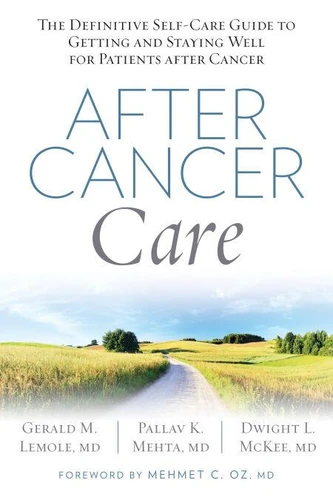After Cancer Care. The Definitive Self-Care Guide to Getting and Staying Well for Patients after Cancer
Par : , , ,Formats :
Disponible dans votre compte client Decitre ou Furet du Nord dès validation de votre commande. Le format ePub protégé est :
- Compatible avec une lecture sur My Vivlio (smartphone, tablette, ordinateur)
- Compatible avec une lecture sur liseuses Vivlio
- Pour les liseuses autres que Vivlio, vous devez utiliser le logiciel Adobe Digital Edition. Non compatible avec la lecture sur les liseuses Kindle, Remarkable et Sony
- Non compatible avec un achat hors France métropolitaine
 , qui est-ce ?
, qui est-ce ?Notre partenaire de plateforme de lecture numérique où vous retrouverez l'ensemble de vos ebooks gratuitement
Pour en savoir plus sur nos ebooks, consultez notre aide en ligne ici
- Nombre de pages304
- FormatePub
- ISBN978-1-62336-503-5
- EAN9781623365035
- Date de parution25/08/2015
- Protection num.Adobe DRM
- Taille1 Mo
- Infos supplémentairesepub
- ÉditeurRodale Books
Résumé
After the intense experience and range of emotion that comes with surgery, radiation, or chemotherapy (or all three), cancer patients often find themselves with little or no guidance when it comes to their health post-treatment. After Cancer Care is the much-needed authoritative, approachable guide that fills this gap. It includes information on how to maintain physical health-with chapters on epigenetics, nutrition, and exercise-as well as emotional health through stress management techniques.
The cutting-edge and growingly popular science of Epigenetics has shown that you are not stuck with your genetic history: your choices in diet, exercise, and even relationships can help determine whether or not your genes promote cancer, and therefore determine your propensity for relapse. Your lifestyle has an effect on the most common types of cancer including breast cancer, prostate cancer, melanoma, endometrial cancer, colon cancer, bladder cancer, and lymphoma.
The doctors present easy-to-incorporate lifestyle changes to help you "turn on" hundreds of genes that fight cancer, and "turn off" the ones that encourage cancer, while recommending lifestyle plans to address each type. In addition, they share 34 healthy recipes and tips on staying active and exercising, detoxifying your house and environment, and taking supplements to help prevent relapse. With more than three decades of post-cancer-care experience, Drs.
Lemole, Mehta, and McKee break down the science into palatable, practical takeaways so that you can drastically improve your quality of life and enjoy many years of cancer-free serenity.
The cutting-edge and growingly popular science of Epigenetics has shown that you are not stuck with your genetic history: your choices in diet, exercise, and even relationships can help determine whether or not your genes promote cancer, and therefore determine your propensity for relapse. Your lifestyle has an effect on the most common types of cancer including breast cancer, prostate cancer, melanoma, endometrial cancer, colon cancer, bladder cancer, and lymphoma.
The doctors present easy-to-incorporate lifestyle changes to help you "turn on" hundreds of genes that fight cancer, and "turn off" the ones that encourage cancer, while recommending lifestyle plans to address each type. In addition, they share 34 healthy recipes and tips on staying active and exercising, detoxifying your house and environment, and taking supplements to help prevent relapse. With more than three decades of post-cancer-care experience, Drs.
Lemole, Mehta, and McKee break down the science into palatable, practical takeaways so that you can drastically improve your quality of life and enjoy many years of cancer-free serenity.
After the intense experience and range of emotion that comes with surgery, radiation, or chemotherapy (or all three), cancer patients often find themselves with little or no guidance when it comes to their health post-treatment. After Cancer Care is the much-needed authoritative, approachable guide that fills this gap. It includes information on how to maintain physical health-with chapters on epigenetics, nutrition, and exercise-as well as emotional health through stress management techniques.
The cutting-edge and growingly popular science of Epigenetics has shown that you are not stuck with your genetic history: your choices in diet, exercise, and even relationships can help determine whether or not your genes promote cancer, and therefore determine your propensity for relapse. Your lifestyle has an effect on the most common types of cancer including breast cancer, prostate cancer, melanoma, endometrial cancer, colon cancer, bladder cancer, and lymphoma.
The doctors present easy-to-incorporate lifestyle changes to help you "turn on" hundreds of genes that fight cancer, and "turn off" the ones that encourage cancer, while recommending lifestyle plans to address each type. In addition, they share 34 healthy recipes and tips on staying active and exercising, detoxifying your house and environment, and taking supplements to help prevent relapse. With more than three decades of post-cancer-care experience, Drs.
Lemole, Mehta, and McKee break down the science into palatable, practical takeaways so that you can drastically improve your quality of life and enjoy many years of cancer-free serenity.
The cutting-edge and growingly popular science of Epigenetics has shown that you are not stuck with your genetic history: your choices in diet, exercise, and even relationships can help determine whether or not your genes promote cancer, and therefore determine your propensity for relapse. Your lifestyle has an effect on the most common types of cancer including breast cancer, prostate cancer, melanoma, endometrial cancer, colon cancer, bladder cancer, and lymphoma.
The doctors present easy-to-incorporate lifestyle changes to help you "turn on" hundreds of genes that fight cancer, and "turn off" the ones that encourage cancer, while recommending lifestyle plans to address each type. In addition, they share 34 healthy recipes and tips on staying active and exercising, detoxifying your house and environment, and taking supplements to help prevent relapse. With more than three decades of post-cancer-care experience, Drs.
Lemole, Mehta, and McKee break down the science into palatable, practical takeaways so that you can drastically improve your quality of life and enjoy many years of cancer-free serenity.



